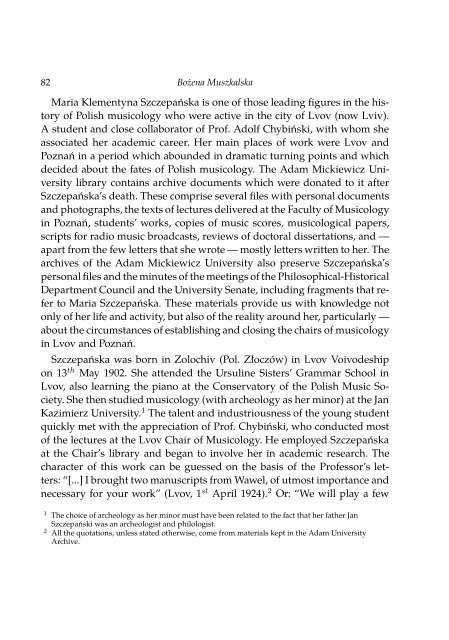Musicology Today 2012 100 Years of Polish Musicology
Musicology Today 2012 100 Years of Polish Musicology
Musicology Today 2012 100 Years of Polish Musicology
You also want an ePaper? Increase the reach of your titles
YUMPU automatically turns print PDFs into web optimized ePapers that Google loves.
82 Bożena Muszkalska<br />
Maria Klementyna Szczepańska is one <strong>of</strong> those leading figures in the history<br />
<strong>of</strong> <strong>Polish</strong> musicology who were active in the city <strong>of</strong> Lvov (now Lviv).<br />
A student and close collaborator <strong>of</strong> Pr<strong>of</strong>. Adolf Chybiński, with whom she<br />
associated her academic career. Her main places <strong>of</strong> work were Lvov and<br />
Poznań in a period which abounded in dramatic turning points and which<br />
decided about the fates <strong>of</strong> <strong>Polish</strong> musicology. The Adam Mickiewicz University<br />
library contains archive documents which were donated to it after<br />
Szczepańska’s death. These comprise several files with personal documents<br />
and photographs, the texts <strong>of</strong> lectures delivered at the Faculty <strong>of</strong> <strong>Musicology</strong><br />
in Poznań, students’ works, copies <strong>of</strong> music scores, musicological papers,<br />
scripts for radio music broadcasts, reviews <strong>of</strong> doctoral dissertations, and —<br />
apart from the few letters that she wrote — mostly letters written to her. The<br />
archives <strong>of</strong> the Adam Mickiewicz University also preserve Szczepańska’s<br />
personal files and the minutes <strong>of</strong> the meetings <strong>of</strong> the Philosophical-Historical<br />
Department Council and the University Senate, including fragments that refer<br />
to Maria Szczepańska. These materials provide us with knowledge not<br />
only <strong>of</strong> her life and activity, but also <strong>of</strong> the reality around her, particularly —<br />
about the circumstances <strong>of</strong> establishing and closing the chairs <strong>of</strong> musicology<br />
in Lvov and Poznań.<br />
Szczepańska was born in Zolochiv (Pol. Złoczów) in Lvov Voivodeship<br />
on 13 th May 1902. She attended the Ursuline Sisters’ Grammar School in<br />
Lvov, also learning the piano at the Conservatory <strong>of</strong> the <strong>Polish</strong> Music Society.<br />
She then studied musicology (with archeology as her minor) at the Jan<br />
Kazimierz University. 1 The talent and industriousness <strong>of</strong> the young student<br />
quickly met with the appreciation <strong>of</strong> Pr<strong>of</strong>. Chybiński, who conducted most<br />
<strong>of</strong> the lectures at the Lvov Chair <strong>of</strong> <strong>Musicology</strong>. He employed Szczepańska<br />
at the Chair’s library and began to involve her in academic research. The<br />
character <strong>of</strong> this work can be guessed on the basis <strong>of</strong> the Pr<strong>of</strong>essor’s letters:<br />
“[...] I brought two manuscripts from Wawel, <strong>of</strong> utmost importance and<br />
necessary for your work” (Lvov, 1 st April 1924). 2 Or: “We will play a few<br />
1 The choice <strong>of</strong> archeology as her minor must have been related to the fact that her father Jan<br />
Szczepański was an archeologist and philologist.<br />
2 All the quotations, unless stated otherwise, come from materials kept in the Adam University<br />
Archive.
















